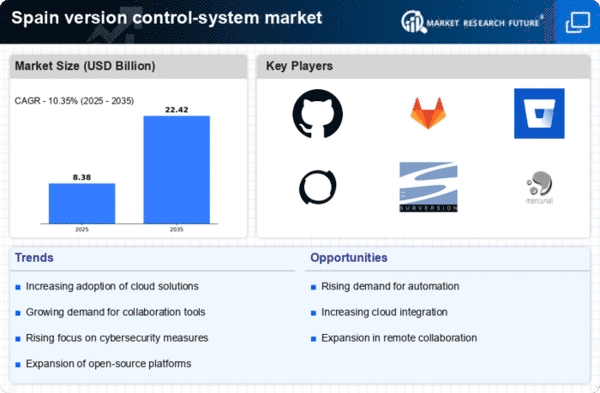Adoption of Agile Methodologies
The adoption of agile methodologies is a significant driver for the version control-system market in Spain. Agile practices emphasize iterative development, continuous feedback, and rapid delivery, necessitating the use of effective version control systems. These systems support agile teams by enabling them to manage code changes efficiently and collaborate effectively. The market data indicates that organizations implementing agile methodologies are witnessing a productivity increase of approximately 20%. This shift towards agile practices is likely to fuel the demand for version control systems, as companies seek tools that align with their agile workflows. Consequently, the version control-system market in Spain is poised for growth as more organizations embrace agile principles.
Rising Demand for Collaboration Tools
The version control-system market in Spain is experiencing a notable surge in demand for collaboration tools. As organizations increasingly adopt remote and hybrid work models, the need for effective collaboration solutions has become paramount. Version control systems facilitate seamless collaboration among development teams, allowing multiple users to work on the same project simultaneously without conflicts. This trend is reflected in the market data, which indicates that the collaboration tools segment is projected to grow by approximately 15% annually. The ability to track changes, manage versions, and maintain a clear history of modifications enhances productivity and fosters innovation. Consequently, this driver is likely to propel the growth of the version control-system market in Spain, as businesses seek to optimize their workflows and improve team dynamics.
Regulatory Compliance and Data Governance
the version control-system market in Spain is influenced by regulatory compliance and data governance requirements.. Organizations are under pressure to adhere to various regulations concerning data security and software development practices. Version control systems play a crucial role in ensuring compliance by providing a clear audit trail of changes made to code and documentation. Market data suggests that companies prioritizing compliance are likely to invest more in version control solutions, with an expected growth rate of 8% in this segment. This focus on regulatory adherence not only mitigates risks but also enhances the overall quality of software products. As a result, the version control-system market is expected to expand as businesses seek to align their practices with regulatory standards.
Increased Investment in Software Development
In Spain, the version control-system market is benefiting from increased investment in software development. As businesses recognize the importance of digital transformation, they are allocating more resources to enhance their software capabilities. This trend is reflected in the market data, which shows that software development budgets are expected to rise by 10% annually. Such investments often include the adoption of advanced version control systems that streamline development processes and improve team collaboration. As organizations seek to innovate and stay competitive, the demand for effective version control solutions is likely to grow, thereby propelling the version control-system market forward in Spain.
Growing Emphasis on Software Quality Assurance
In Spain, the version control-system market is significantly influenced by the increasing emphasis on software quality assurance. As businesses strive to deliver high-quality software products, the integration of version control systems has become essential. These systems enable developers to maintain code integrity, track changes, and revert to previous versions when necessary, thereby reducing the likelihood of errors. Market data suggests that the software quality assurance segment is expected to expand by around 12% in the coming years. This focus on quality not only enhances customer satisfaction but also minimizes the costs associated with post-release defects. As a result, the demand for robust version control systems is likely to rise, further driving the growth of the market in Spain.
















